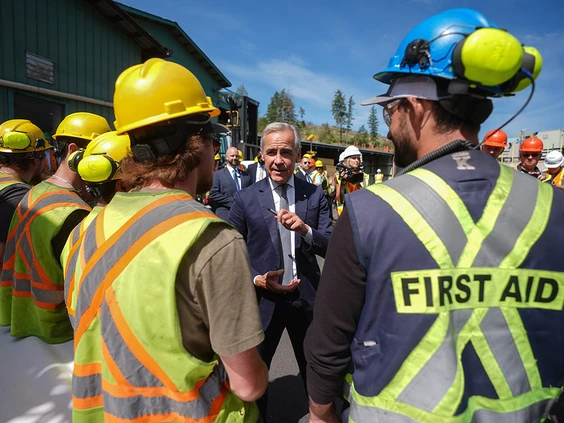British Columbia (Richa Walia): The federal government’s $1.2 billion relief package for Canada’s struggling forestry sector has received a cautious welcome in British Columbia, where industry leaders stress that long-term solutions must include a new trade agreement with the United States.
The announcement, made by Prime Minister Mark Carney in West Kelowna on Tuesday, comes as American import duties on Canadian softwood lumber continue to rise. Under the plan, $700 million will be allocated for loan guarantees to help companies stabilize operations, while $500 million will fund the development of new products and markets. An additional $500 million will support retraining programs for workers affected by the industry downturn.
“At this hinge moment in history, Canada is starting to shift from reliance to resilience,” Carney said, adding that Ottawa will prioritize Canadian lumber in his Build Canada Homes Plan, which aims to construct 500,000 homes annually over the next decade.
Industry Warns of Rising U.S. Duties
Brian Menzies, executive director of the Independent Wood Processors Association of B.C., welcomed the financial package but warned that U.S. tariffs remain the biggest threat. He expects countervailing duties to increase total tariffs to nearly 35 percent in the coming weeks.
“The challenge is that after eight years of posting bonds, many of these companies are out of collateral. Some owners have even pledged their personal homes to stay afloat,” Menzies said. He also raised concerns about retroactive duties applied to 2023, which he fears could push smaller businesses to the brink of collapse.
B.C.’s Share of the Funds
Forests Minister Ravi Parmar indicated that B.C., which produces roughly one-third of Canada’s softwood lumber, is expecting around $500 million from the federal package. “Is it everything we need? No, but it’s a start,” Parmar said. “We’ll work closely with Ottawa to ensure British Columbia receives its fair share.”
Kim Haakstad, CEO of the B.C. Council of Forest Industries, echoed this sentiment, noting that while federal aid is welcome, the province must also act. “We need to stop managing decline and focus on making B.C.’s forestry sector more competitive,” she said, pointing to Premier David Eby’s pledge to provide producers with 45 million cubic metres of fibre annually.
Trade Deal Seen as Essential
Industry leaders continue to press Ottawa to prioritize negotiations with Washington. “Without a deal to reduce or remove these tariffs, the financial strain will keep mounting,” Menzies warned.
Despite the cautious optimism surrounding the federal package, the forestry sector in B.C. remains clear: without addressing U.S. trade barriers, the funding will be only a temporary lifeline rather than a long-term solution.

